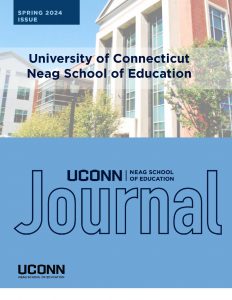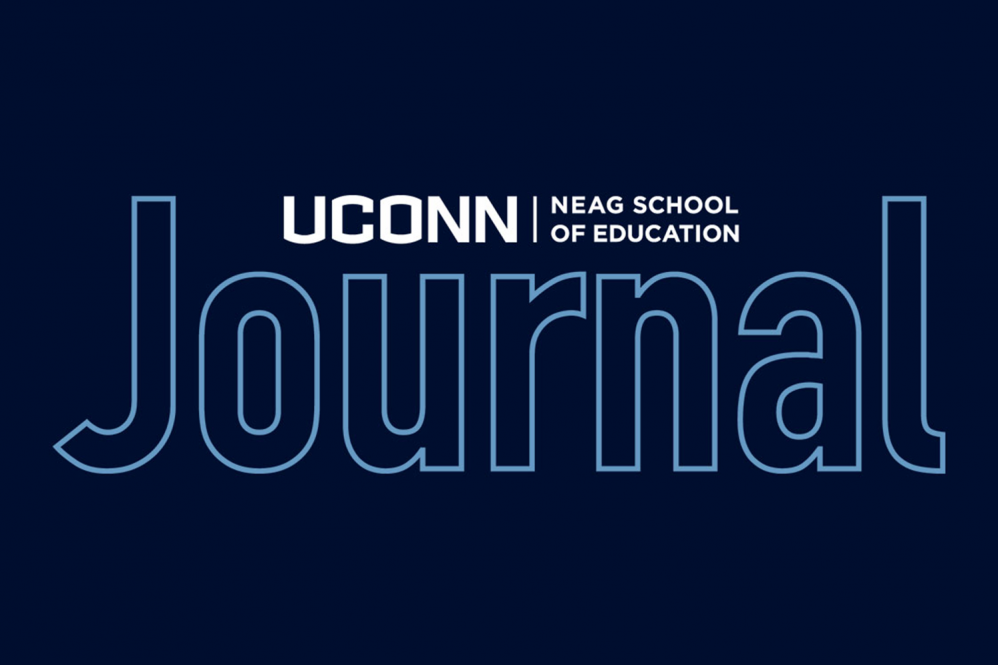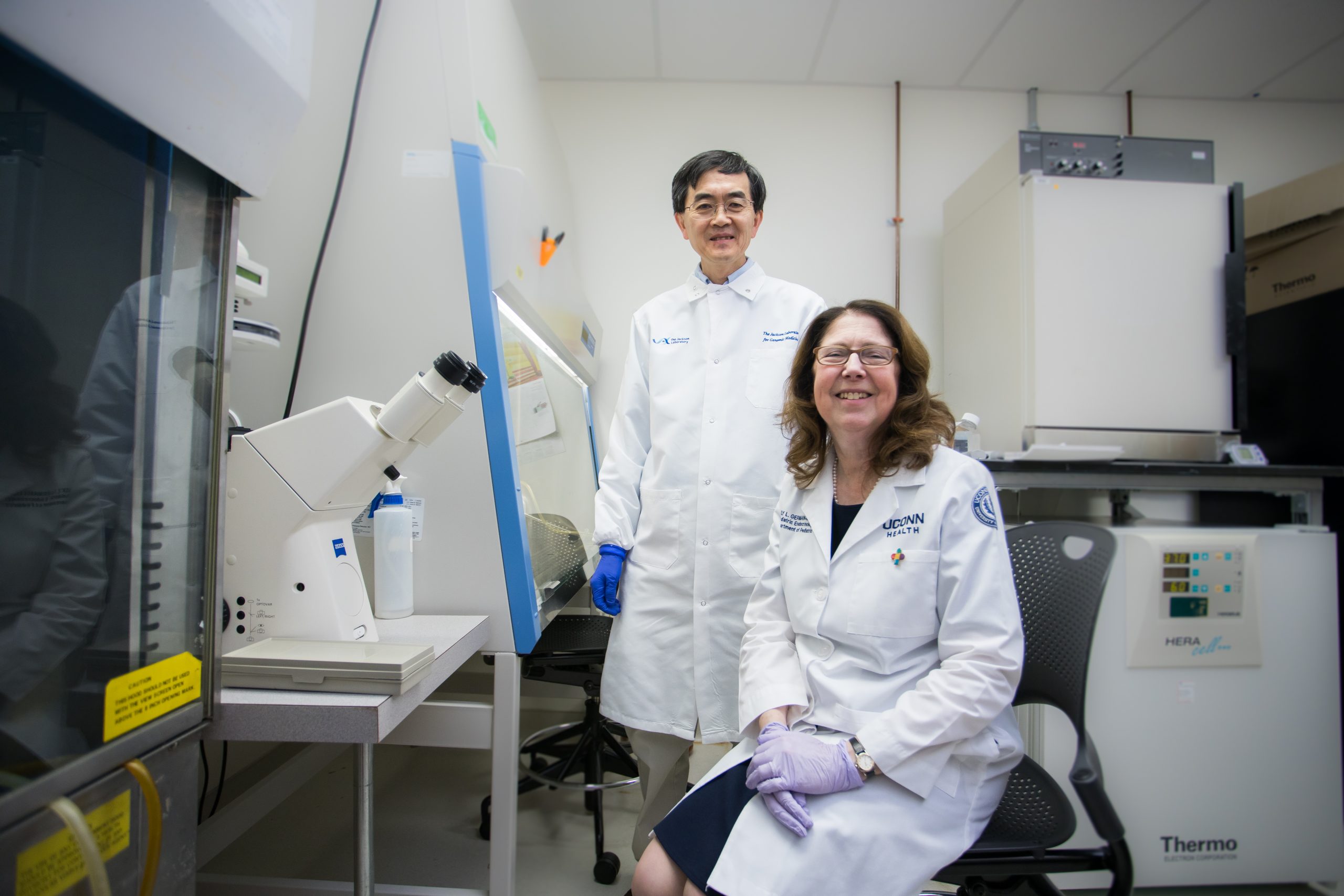The UConn Neag School of Education’s academic journal has published its second issue, thanks to the hard work and dedication of a group of graduate students.
“We are overjoyed to share the second issue of the Neag School of Education Journal,” reads a letter from the journal’s board members in the Spring 2024 issue. “Leading from our mission, our journal provides a unique space for graduate and early career scholars to develop and share a broad variety of scholarly work, including research articles, essays, literature reviews, and reflective pieces. … Each of this year’s articles exemplify the equity-grounded, methodologically rigorous, and innovative research that this journal endeavors to elevate.”
 The Neag School of Education Journal is an editor-reviewed, open-access, annual journal. Founded and run by graduate students and published online through the Neag School, its primary purpose is to offer a platform for graduate students to share their research and knowledge with academic communities. It also hopes to broaden and deepen the literature of education as written and experienced by graduate students and early-career scholars. Eleven graduate students from the Neag School make up the journal’s current board.
The Neag School of Education Journal is an editor-reviewed, open-access, annual journal. Founded and run by graduate students and published online through the Neag School, its primary purpose is to offer a platform for graduate students to share their research and knowledge with academic communities. It also hopes to broaden and deepen the literature of education as written and experienced by graduate students and early-career scholars. Eleven graduate students from the Neag School make up the journal’s current board.
The journal prizes pieces that seek to “improve education and social systems in order to facilitate increasingly effective, equitable, and socially just practices for educators and practitioners from a variety of fields, perspectives, and theoretical lenses as they serve their local communities.”
The four articles accepted and published in the Spring 2024 issue are:
- “Neuroscience Concepts Supporting Teachers’ Adaptive Expertise″ – an essay that delves into the integration of neuroscience concepts in teaching, emphasizing the importance of understanding cognitive and neural mechanisms for effective instructional decisions.
- “From Fixed to Flexible: Needed Conditions to Promote Elementary Teachers’ Equitable Use of Within-Class Ability Grouping” – an essay that explores the historical context of fixed and flexible within-class student grouping practices and examines their impact on students’ access to equitable learning outcomes.
- “Does This Mean We Get an A? Causal Implications of Changes in School Accountability” – a quantitative research piece that utilizes regression discontinuity to draw causal conclusions about the impact of school rating categorization through the New York City Department of Education’s most recent school report card rating system.
- “Perceptions of Higher Education Professionals on the Utility of the Activities, Programs, or Policies Tool to Promote Self-Determination for College Students with Disabilities” – a qualitative exploratory study that investigates the experiences of 30 post-secondary disability resource and student affairs professionals with the Activities, Programs, or Policies (APP) Tool.
In addition to providing graduate students and early-career scholars an opportunity to share their work more widely, the editors say the journal fosters collaboration among students and their colleagues. It also helps to demystify the publishing process and supports editors as they move toward publishing their own work in the field. Making the journal open access was also important, ensuring that its content could serve as an available source of information for current and future practitioners. Importantly, authors maintain their copyright and thus can work on their pieces after publication for future submission elsewhere – a feature aligned with the journal’s orientation toward building authors’ capacity and opportunities.
The journal will begin accepting manuscripts for its third issue later this year. Details will be shared on the journal’s webpage, which will also include a submission form when the submission window reopens. Manuscripts must be one of the following four types: research articles, essays, literature reviews, or personal reflections. Of course, the manuscript must deal with a topic of interest to those in the field of education.
We have many fantastic and dedicated people to thank for the realization of our second issue,” the letter from the board members says. “To Dr. Jennie Weiner, our advisor, thank you for your tireless dedication to this journal and to students. You model to us what a human-centered and compassionate review process can be and have taught us enduring lessons as reviewers and researchers. Another ‘thank you’ to Dr. Jason Irizarry, our dean, who has enthusiastically supported the journal from its inception and made it clear that our work and voices matter. … Thank you to the members of the journal whose hard work and enthusiasm made this issue possible. We are excited to continue advancing this work with your assistance going forward. Finally, thank you to the authors of the pieces featured in this issue and all who submitted work. It goes without saying that this would be impossible without your contributions. We are immensely proud to feature your work in this issue.”
To learn more about the Neag School of Education Journal, visit education.uconn.edu/neag-journal.



